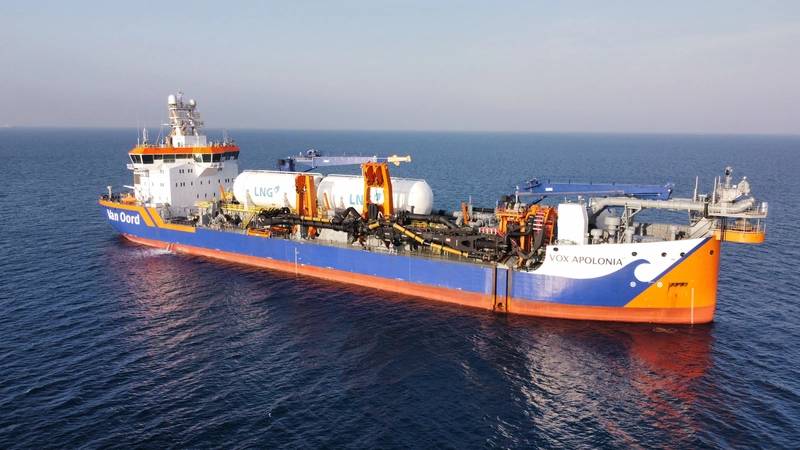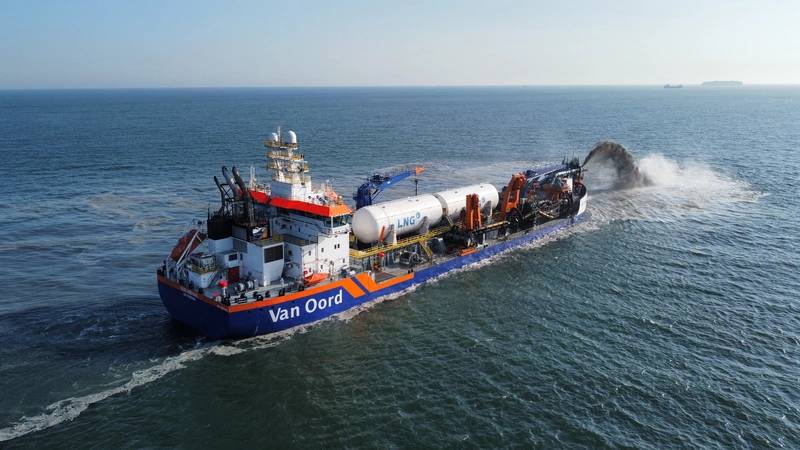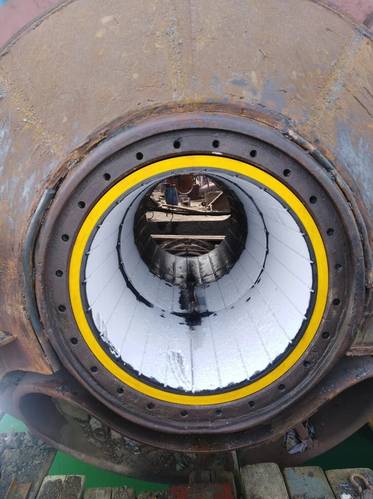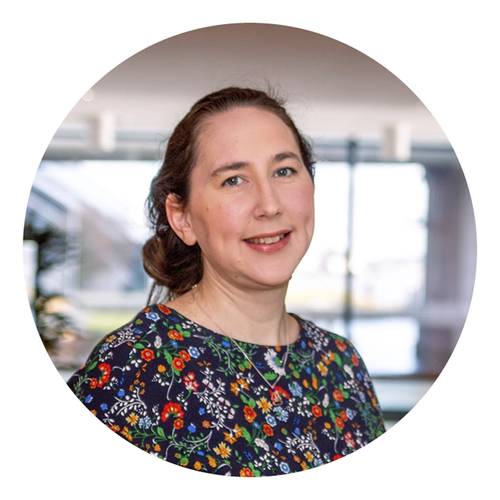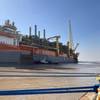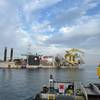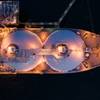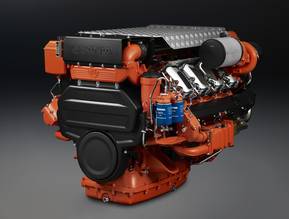Dredge Firms Focus on Sustainability as ESG Issues Climb Agenda
Climate change, rising sea levels, land reclamation and offshore energy are all factors underpinning business models at Europe’s dredge and marine engineering majors. They are adopting strong sustainability credentials as their operations come under closer environmental, social, governance (ESG) scrutiny and new opportunities open up in the US offshore wind sector
The relatively small number of global marine engineering and dredge firms face more observation of their business models than ever before. The up-close monitoring of operations comes at a time when the services that they provide are essential to many communities on low-lying islands, in coastal regions, and to offshore energy developers.
Outside Asia, most of the major firms are based in Europe but often, the same names are to be found on capital dredge and marine engineering projects everywhere. They include DEME (Belgium), Jan de Nul (Belgium), Van Oord (Netherlands), and Royal Boskalis Westminster (Netherlands). Other leading firms include Great Lakes Dredge and Dock Company (GLDD), headquartered in Houston, and National Marine Dredging Company (NMDC), of Abu Dhabi.
It was a consortium of these firms, for example, which undertook the $4.2 billion Suez Canal expansion project in 2014-15. And, in December, the Suez Canal Authority awarded NMDC a $272 million contract to dredge a stretch of the waterway where the infamous Ever Given ran aground in March 2021.
These major dredge firms, which are also establishing new fleets in the offshore wind sector, target projects in many regions of the world and are increasingly focused on their ESG credentials. Sustainability is a number one priority and now that carbon intensity has risen to the top of the International Maritime Organization’s agenda, they are in a spotlight beam as bright as ever.
“Communities around the world are feeling the effects of climate change in their everyday lives, and on the nature that surrounds them. The impact is far-reaching. Van Oord is committed to helping protect them,” said Rachel Terry, Van Oord’s Sustainability Program Manager. “Sustainability, innovation, and collaboration are key to successfully facing today’s global challenges.”
Outlining the Dutch company’s strategy, she said, “Our equipment roadmap focuses on low carbon fuels and energy efficiency. While we don’t know precisely which renewable fuels will become available and when, we’re already fitting out all our newbuilds for it. In the meantime, we can use biofuels and LNG. Regardless of the fuel, it always pays to be as energy efficient as possible.”
The company aims to achieve net-zero by 2050 and recent acquisitions demonstrate its strategy. Identified as a ‘trailblazer for international standards aimed at minimising climate and environmental impact’, Van Oord has recently commissioned three trailing suction hopper dredgers – Vox Ariane, Vox Alexia and Vox Appolonia – with LNG-as-fuel capability. Meanwhile, a green hybrid cable-laying vessel, Calypso, designed initially to use biofuel, is nearing completion at Vard Bratvaag shipyard in Norway.
When commissioned late this year, she will install inter array grid and export cables for offshore wind projects and her engines will switch to new e-fuels when they become available in the future. She will have a large battery pack, a shore electricity supply connection, and an energy management system minimising carbon dioxide, NOx, SOx and particulate emissions, Terry said.
“Our new offshore installation vessel, Boreas, is methanol-ready and therefore a frontrunner within the industry,” she added. “We also now operate two hybrid water injection dredgers, which provide an environmentally friendly way of maintaining the depth of navigation channels, ports and rivers.”
DEME meanwhile, which claims to be the largest operator of green vessels in the sector, has clinched a contract from Empire Offshore Wind – a joint venture between Norway’s Equinor and bp – to transport and install inter-array cables for the Empire Wind 1 and 2 offshore wind farms.
Sustainability is a priority at DEME which holds a stake in Hyport Duqm, a project to develop a green hydrogen and green ammonia plant with 500MW of electrolysis capacity in Oman. Energy capacity for the hydrogen plant will come from about 1.3GW of power from wind turbines and solar panels. The company has a number of other environmental initiatives in progress.
Dredge and maritime infrastructure firm, Boskalis, recently acquired by Curaçao-based HAL Holding NV and delisted from the Euronext stock exchange in Amsterdam, has been commissioned on the second phase of climate-adaptive measures in the Maldives. The $127 million project, announced in January, follows close to two daecades of Boskalis engagement in the country and will involve the deployment of a large trailing suction hopper dredge to reclaim new land using about 636 million cubic feet of sand, with rock revetment for shoreline protection.
Grease-free Bearings
Canada-based Thordon Bearings, which recently stressed the environmental value of oil- and grease-free bearings for workboats deployed both on America’s extensive inland waterway network and that of South America, has also made successful inroads into the dredge sector. The company’s water-lubricated cutterhead and intermediate shaft line bearings do not require oil or grease, thereby reducing pollution risk significantly.
Thordon has established strong relationships with Middle East dredge firms. Its three decade-long relationship with Abu Dhabi-based National Marine Dredging Company (NMDC), for example, has seen the firm equip nearly all of its dredge units with water-lubricated composite systems for cutterhead and intermediate line shaft bearings.
A recent example is the 1995-built Umm Al Anber, a 236-ft. heavy-duty cutter suction dredge which had its cutterhead shaft bearings replaced during a refit in Dubai Maritime City. The project, which involved close involvement from Thordon’s Dubai-based distributor for the Middle East, Ocean Power International LLC, included shaft dismantling, laser alignment, in-situ line boring, calibration, installation and commissioning.
Around 10 other NMDC vessels have had Thordon bearing upgrades, with one cutterhead shaft installed on the dredge, Al Mirfa, remaining in good condition even after 100,000 operating hours in waters heavy with silt, sand, rocks and stones. George Morrison, Thordon’s Mid East Regional Manager, declared the component still to be in perfect working order.
NMDC Fleet Manager, Mohammed Fawzy Khalifa, commented: “We have been using Thordon’s grease-free polymer bearings since the 1990s. Compared to traditional rubber cutterhead bearings, we find that Thordon composite reduces vessel operating costs substantially. The bearing requires no lubricating grease and extends bearing wear life fourfold, which is very impressive given the type of environments in which these dredgers operate.”
Separately, the Suez Canal Authority (SCA) replaced the rubber cutterhead bearings on its 335-foot dredge, Mahmoud Younis, with water-lubricated composite units. The installation followed a similar exercise on board the Mashhour, the largest cutter suction dredge in the SCA fleet.
Commenting on this retrofit, SCA Fleet Manager, Khaled Youssef, said: “Mashour has been operating flawlessly for 12 months with the Thordon composite bearing. In that short period of time, we have experienced reduced vessel operating costs and less downtime compared to the previous installation. The composite bearing is more environmentally friendly since it does not require any lubricating grease.”







